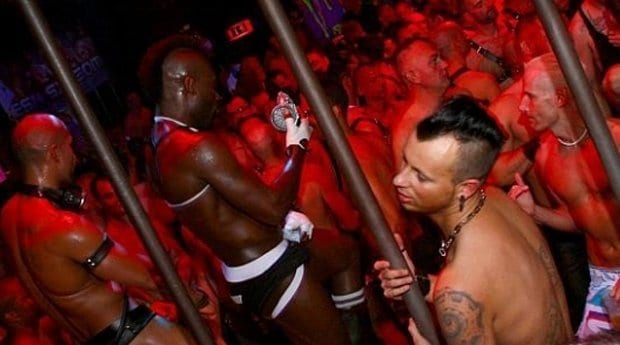“No, no, honey! Germany is different!” shrieks a horrified young American at my hotel, on the phone to his gal pal back home. This panic is in stark contrast to the chirpy, Drag Race–inspired “Gurrrrrl, we’re gonna get our drink on tonight!” overheard just hours earlier.
It seems nobody told him people have sex in the bars in Germany.
It’s close to midnight in Berlin. I’ve returned to my hotel to change before joining a friend at a local bar — one with a “strict” dress code and a fairly liberal atmosphere. It seems my room-neighbour didn’t count on Berlin’s atmosphere being quite so liberal. I’m not prepared to judge. It’s a rookie mistake, but our young friend is a rookie, and to be honest, so am I.
It’s my first time in the clubbing capital of Europe, home to such hallowed techno temples as Berghain and Tresor. It’s also a city where unabashed sexuality thrives amid pulsing lights and invasive beats. Did my neighbour smooth out his twisted Andrew Christians and give the city’s nightlife another shot? I’m guessing he did. In the words of another friend, taking a sly dig at my destination, “nobody goes there for the churches.”
Berlin is a party city year-round, but my visit coincides with the Eurovision Song Contest, a night that glues more than 180 million Europeans to their TVs for 26 pop songs, allegations of vote rigging, cheesy jokes, sarcastic commentary, sequins, pyrotechnics and miles upon miles of offensively white pants. Scoff if you will (and many do), but in Germany, this festival of high camp and higher drama is serious business. Its reverence was clear when Düsseldorf hosted the show in 2011, a contest widely praised as one of the best in recent memory.
Though Berlin has never hosted Eurovision, a walk around Schöneberg in the preceding week reveals a neighbourhood in love. Bars and restaurants advertise viewing parties, while the greatest hits of contests gone by blare from shop doorways. A menswear store on Maassenstrasse offers 12 percent off its range all week (12 being the maximum number of points any country can award another in Eurovision). On hearing my Australian accent, a friendly assistant rushes to the back and switches the music to Gina G, no doubt in the hope I’ll spend “Ooh Aah . . . Just a Little Bit” more.
It works, but then, Berlin has been softening me up for three days now.
The sheer number and variety of LGBT-friendly (or exclusive) venues in Schöneberg alone is staggering compared to cities of comparable size in Australia and Canada. Cruise bars are ubiquitous, while leather and fetish venues make up an unusually large chunk of the local scene. Even Berghain, which lures thousands of party-goers — most of them straight — into its infamous queue (where many are turned away), hides Lab.Oratory, an industrial fetish playground where the only demand is an open mind and very careful checking of the event calendar before turning up.
Most of the local gays are equally at home in a neighbourhood cocktail bar, dance club or labyrinthine dungeon. This appetite for variety and fun becomes infectious after just a day or two, making Berlin an excellent place to break out of your comfort zone. But nothing is going to keep me from enjoying a Eurovision party surrounded by committed fans, and Prinzknecht gets the nod. By 9pm, I’m surrounded by cheers for Austria’s Conchita Wurst, boos for Russia’s twins (whose act more closely resembles a Hellraiser movie than anything seen in the fetish clubs) and sluggish indifference to Germany’s own song. Meanwhile, in Twitter world, several fake Angela Merkels are dying of shame. Three hours later, Europe has a new, bearded queen of pop, and the well-lubricated crowd has moved on to the rest of their Saturday night.
Meeting my friend, my change of attire has saved me from screaming “tourist.” Several familiar faces from Prinzknecht have similarly transformed for the second part of their night. Given the radical changes and divisions that define its last 100 years, marked contrasts seem to run deep through every facet of Berlin life, and that’s a big part of its appeal.
Most stores remain closed on Sunday, meaning it’s often well past dawn (possibly on Monday) before bleary-eyed partygoers stagger from Berlin’s clubs in search of breakfast. Most of the city’s tourist spots and museums remain open however, including the small Schwules Museum. Once dedicated to Germany’s gay history, it has since expanded to offer a broader queer focus, with guest exhibits from around the world. A wander through its four intimate galleries is the perfect way to end my few days in this unique city, one that’s equally at home with both kitsch and kink.
For the most up-to-date travel information on gay Berlin, see our City Guide, Listings Guide, Events Guide and Activities Guide.
For more on Berlin, read Uncovering Isherwood’s Berlin and Lab.oratory, Berlin’s brashly perverse sex club.

 Why you can trust Xtra
Why you can trust Xtra